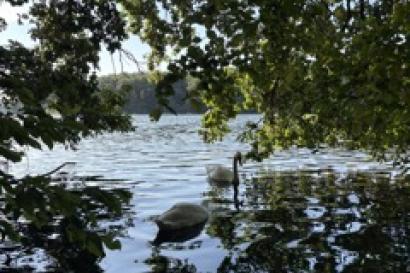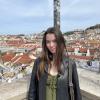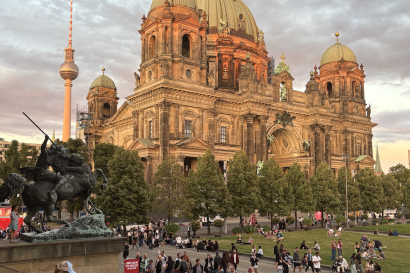In so many European cities, one feels the history while walking down the narrow streets, climbing up stone steps - worn by hundreds of years of treading feet, or admiring the architecture that took generations to complete. It’s easy to imagine thousands of women in corsets and bustles and men in coattails and top hats crowded into the parks beneath the Eiffel Tower for the 1889 World’s Fair. After bicycling through Prague, one can imagine the carts and carriages that once rattled down those same steep, cobblestone streets.
Berlin can claim very little of this sort of past beauty. The city that began to grow almost a thousand years ago is long gone, as is the city as it was even a hundred years ago. The evidence of a past beyond the 20th century lies in the flat, waterlogged landscape, whose swamp still makes the establishment of a city a challenge or in the wide, straight streets laid out by a Prussian king. It lies in the Reichstag, built for a unified Germany in 1884, whose glass dome testifies to the destruction caused in the second world war and the hope for a transparent government, and in the Brandenburg Gate, once a symbol of Prussian triumph before it stood for almost thirty years, the wall in its shadow, a symbol of a divided city then of national unification.
While there are several sections of wall that stand as memorials and there is a cobblestone path where the wall once stood, this is hardly all that remains of the once-divided city and country. The wall memorials tell stories of people who escaped, of people who lost their lives, of repression and oppression, of the ultimate victory of capitalism and the decimation of heinous communism. But there is more to the story.
Last weekend Berlin ended its weeklong celebration of the fall of the wall on November 9th, 1989. The week kicked off with a theater piece on the 4th of November, directed by my IES Abroad theater professor. The piece involved speakers, actors, musicians, and dancers. Thirty years before on the same day, in the same place, about a million East Germans gathered on Alexanderplatz under the TV tower and World Time Clock to demonstrate for freedom of travel, democratization, and an end to censorship.
I was lucky enough to go to a few rehearsals and watch as the production came together. A week or so before the 4th, I attended a rehearsal with just the central group of dancers. Toward the end, they rehearsed a dance I hadn’t seen yet. Dressed in Russian fur hats, the band played while all but one dancer stood dancing slightly in place. As the song progressed, the dancers began to fall, and the single dancer moved around the stage lifting each dancer to her feet again. The single dancer, dressed in a suit coat a few sizes too big, became more and more frantic, as keeping the rest standing became more futile. When the music stopped, my professor, born in the east, stepped down from the table on which she was standing, a few tears in her eyes. And the single dancer said she felt like she was the GDR.
I keep thinking about that.
On the evening of the tenth, I had a conversation with my host mom. When the wall fell, late on the 9th of November, 1989, she was asleep. She had school the next morning. She lived in East Berlin. The next morning, she went to school. After school, she and some friends went to check out West Berlin then went back home.
It was good that the wall fell. For the year between the fall in November 1989 and the unification in October 1990, the GDR became a democracy, borders were opened, the Alexanderplatz Demonstration achieved its goals. But for some Germans, like my host mom, the unification was not a unification, it was a takeover. The GDR was dissolved, completely abandoned and simply turned into the FRG (the official name for West Germany then and Germany now). My host mom explained that there were bad things about the East, no freedom of travel and no free speech, for instance, but there were good things: 90% of women were employed in the East, they were already recycling, basic education was high, people were employed, people had homes, and they had communities, much of those things were lost after the decision to unify. My host mom would have liked to be part of a new country, a country with the good things about the GDR and the good things about the FRG.
In the last few years, there has been a statistic circulating on my newsfeed, on Facebook, in my classes, that a majority of east Germans feel like second-class citizens in the reunified nation. In the west, we learned a story without nuance. We forgot, if it is possible to forget something that we never considered, that there were people who lived, grew up, learned, and even thrived in the east. Such recent history is easy to ignore, easy to think of it as the past. The problem with history is that it loses its nuance. But Berlin’s recent history still has its nuance, and it's important to listen for it.
Here are some websites if you are interested in learning some more about the theater piece.
https://www.4november89.de/
https://www.youtube.com/watch?v=MR7wKHIjtYU

Elena Bauer
Apart from my first two years at Pacific Lutheran University in Tacoma, I have lived my whole life in Bellingham, Washington, a college town surrounded by green hills and snowy mountains on one side and the Puget Sound on the other. Since I was eleven, I've made a point to ride my unicycle down my town's Memorial Day parade route before it starts, a tradition interrupted briefly in high school when I was in the marching band. My summer job is teaching swim lessons, and I have gotten quite good at talking a scared four-year-olds into jumping off the diving board.









